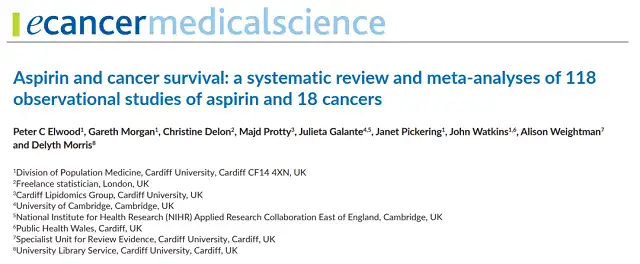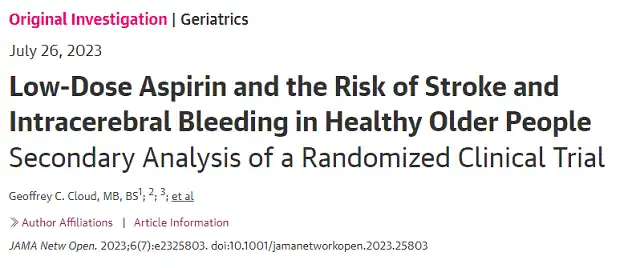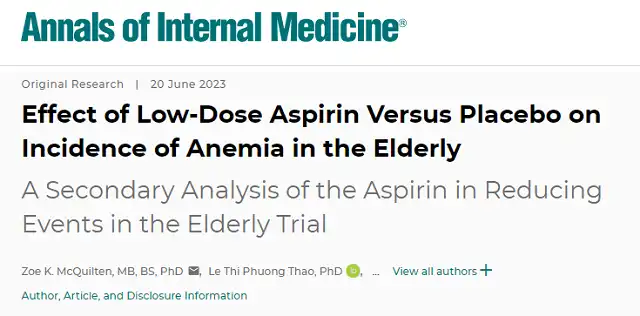New study finds Aspirin can lower diabetes risks
- Normal Liver Cells Found to Promote Cancer Metastasis to the Liver
- Nearly 80% Complete Remission: Breakthrough in ADC Anti-Tumor Treatment
- Vaccination Against Common Diseases May Prevent Dementia!
- New Alzheimer’s Disease (AD) Diagnosis and Staging Criteria
- Breakthrough in Alzheimer’s Disease: New Nasal Spray Halts Cognitive Decline by Targeting Toxic Protein
- Can the Tap Water at the Paris Olympics be Drunk Directly?
New study finds Aspirin can lower diabetes risks
- Should China be held legally responsible for the US’s $18 trillion COVID losses?
- CT Radiation Exposure Linked to Blood Cancer in Children and Adolescents
- FDA has mandated a top-level black box warning for all marketed CAR-T therapies
- Can people with high blood pressure eat peanuts?
- What is the difference between dopamine and dobutamine?
- How long can the patient live after heart stent surgery?
New study finds Aspirin can lower diabetes risks.
Aspirin, also known as acetylsalicylic acid, has been used clinically for more than a century since its launch, and has become one of the three classic drugs in medical history.
It is still the most widely used drug in the world for relieving pain, fever and inflammation.
In addition, aspirin can also be used to prevent heart disease, stroke, and even some types of cancer, such as colorectal cancer. Therefore, it is known as a “miracle drug” that can cure diseases and prevent diseases.
At present, the effect of aspirin on type 2 diabetes is unclear.
Recently, researchers from Monash University in Australia announced a study that will be presented at the European Association for the Study of Diabetes (EASD) Annual Meeting 2023 in Hamburg, Germany from October 2-6, 2023.
The study showed that taking low-dose aspirin daily was associated with a 15% reduction in the risk of type 2 diabetes among older people.

In the study, the researchers conducted a follow-up analysis of the ASPREE trial, which was a double-blind, placebo-controlled trial of aspirin that included 16,209 participants who were randomly assigned to either 100 mg of aspirin or placebo daily, and investigated the random treatment effects of low-dose aspirin on diabetes and fasting blood glucose (FPG) levels in older people.
Participants with diabetes at baseline were excluded by self-reported diabetes, use of antidiabetic drugs, and fasting blood glucose.
Overall, among all participants, 8,086 participants took aspirin and 8,123 participants took placebo.
During a mean follow-up of 4.7 years, a total of 995 new cases of diabetes were recorded, of which 459 were in the aspirin group and 536 were in the placebo group.
The study found that compared with the placebo group, the incidence rate of type 2 diabetes was reduced by 15% in the low-dose aspirin group.
In addition, the annual increase rate of fasting blood glucose levels was also slower in the aspirin group.
The researchers said that aspirin reduced the incidence of diabetes in healthy older people and slowed down the increase of fasting blood glucose over time, suggesting that aspirin may have potential to prevent type 2 diabetes and deserves further research in this regard.
In January 2021, researchers from Li Ka Shing Faculty of Medicine at The University of Hong Kong and Harvard University published a research paper titled “Aspirin Use and Risk of Colorectal Cancer Among Older Adults” in JAMA Oncology.
The study showed that long-term use of aspirin was associated with a reduced risk of colorectal cancer, and starting use before age 70 significantly reduced the risk of colorectal cancer.

In July 2021, researchers from Cardiff University in the UK published a paper titled “Aspirin and cancer survival: a systematic review and meta-analyses of 118 observational studies of aspirin and 18 cancers” in eCancerMedicalScience.
The study analyzed patients with 18 different cancers and found that aspirin was associated with a 20% reduction in cancer deaths.

Although aspirin has some benefits, it may also cause side effects such as increased bleeding risk.
On July 26, 2023, researchers from Monash University in Australia published a paper titled “Low-Dose Aspirin and the Risk of Stroke and Intracerebral Bleeding in Healthy Older People” in JAMA Network Open.
The study showed that low-dose aspirin may have no effect on primary prevention of stroke, but may increase the risk of cerebral hemorrhage by 38%.

On June 20, 2023, researchers from Monash University in Australia published a paper titled “Effect of Low-Dose Aspirin Versus Placebo on Incidence of Anemia in the Elderly: A Secondary Analysis of the Aspirin in Reducing Events in the Elderly Trial” in Annals of Internal Medicine.
The study showed that taking low-dose aspirin daily was associated with a 20% increase in anemia risk. The study suggested that regular monitoring of hemoglobin should be considered for older patients taking aspirin.

Paper links:
Doi:10.1001/jamaoncol.2020.7338
https://doi.org/10.3332/ecancer.2021.1258
doi:10.1001/jamanetworkopen.2023.25803
https://doi.org/10.7326/M23-0675
New study finds Aspirin can lower diabetes risks
(source:internet, reference only)
Disclaimer of medicaltrend.org
Important Note: The information provided is for informational purposes only and should not be considered as medical advice.



